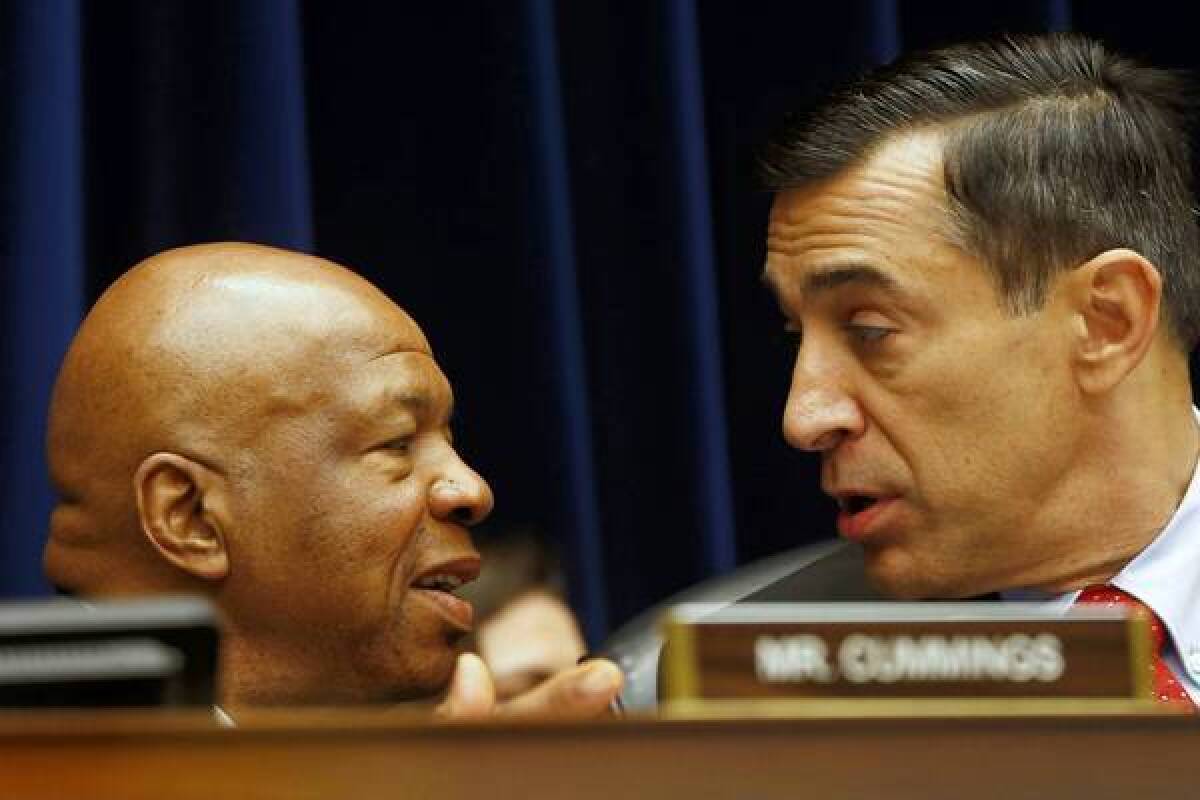IRS manager says tea party groups not politically targeted

- Share via
WASHINGTON — An Internal Revenue Service manager who described himself as a “conservative Republican” told congressional investigators that no one in the agency’s Cincinnati office was trying to target tea party organizations for political reasons, according to an interview transcript released Tuesday.
The manager, John Shafer, said he and an employee in his screening unit decided to pull applications for tax-exempt status filed by political groups and send them to managers in Washington. He said they were aware of the controversy over the groups and wanted to ensure they were treated uniformly.
“Because of media attention that he had seen, he had concerns about this being a high-profile case,” Shafer said. He said he believed the screening was motivated only by the need for “consistency and identifying issues that needed to have further development.”
Rep. Elijah E. Cummings of Maryland, the top Democrat on the House Oversight and Government Reform Committee, released the 205-page transcript to “debunk conspiracy theories” about the improper targeting of conservative organizations by the IRS.
The congressional investigation, which began last month amid bipartisan pledges of cooperation, quickly deteriorated into a feud between Cummings and the chairman, Rep. Darrell Issa (R-Vista).
Two weeks ago, Issa cited excerpts from interviews that he said showed IRS employees in Cincinnati were being “directly ordered” by officials in Washington. He declined at the time to release the transcripts. Cummings said Issa’s decision not to release excerpts was not “responsible, fair or legitimate.”
The committee’s Republican staff has since allowed reporters to review transcripts of interviews with several IRS officials, but not with Shafer. The names of the IRS officials were redacted from the transcripts, but their identities were confirmed Tuesday by a committee staff member.
Issa said in a statement Tuesday that he was “deeply disappointed” that Cummings decided to release the transcript, which he said “will serve as a road map” for other IRS officials facing investigators.
Details of the debacle at the IRS became public last month with the release of an inspector general’s report that showed employees in Cincinnati used politically loaded terms, including “tea party” and “patriots,” to pull out applications for additional scrutiny.
Many of those groups later received letters with overly intrusive questions, including requests for lists of donors and descriptions of political conversations. Steven Miller, the acting IRS head, was forced to resign, and Lois Lerner, the head of the agency’s office of exempt organizations, was suspended after she invoked the 5th Amendment and refused to answer questions before Issa’s committee.
So far, no evidence has emerged during the committee’s hearings or interviews that anyone at the IRS or the White House was directing a politically motivated campaign during an election year.
At the same time, IRS employees described a process that, from the beginning, was being closely reviewed by agency lawyers in Washington.
The thorny issue before the IRS was how to treat nonprofits that participated in campaigns. The rules say some such activity is permissible, as long as it’s not the groups’ primary purpose, but neither the agency nor Congress has set clear standards on what that means.
The Cincinnati screener who began pulling the cases in early 2010, Gary Muthert, told investigators that Shafer said, “Washington, D.C., wanted some cases” of politically active nonprofits to review.
“We had a tea party case come in, so we used the words ‘tea party,’” Muthert said, describing how the decision was made to use those keywords. He said Shafter told him to use that phrase, but Shafer told investigators he didn’t recall giving those instructions.
Liz Hofacre, a senior manager at the Cincinnati unit, told the committee that an attorney in Washington began to oversee the reviews, asking to see every follow-up letter sent to the groups. Hofacre said the scrutiny was unprecedented and “demeaning.” But she said higher-ups never gave instructions on how to treat the applications; as a result, some languished for more than two years.
“All I remember saying and thinking is this is ridiculous,” Hofacre said.
Later, Hofacre said, she was “furious” when Lerner blamed the problems on lower-level employees. “It was a nuclear strike on us,” she said.
Holly Paz, another IRS official in Washington, said she was confident screeners were using words such as “tea party” as shorthand for groups involved in campaigns. “Like calling soda ‘Coke,’ or, you know, tissues ‘Kleenex,’” she said.
Paz said many of the tax agency’s employees “were used to a world” where no one would ever know how they talked about cases internally. “So I don’t think they thought much about how it would appear to others,” she said. “They knew what they meant, and that was sort of good enough for them.”
More to Read
Sign up for Essential California
The most important California stories and recommendations in your inbox every morning.
You may occasionally receive promotional content from the Los Angeles Times.











